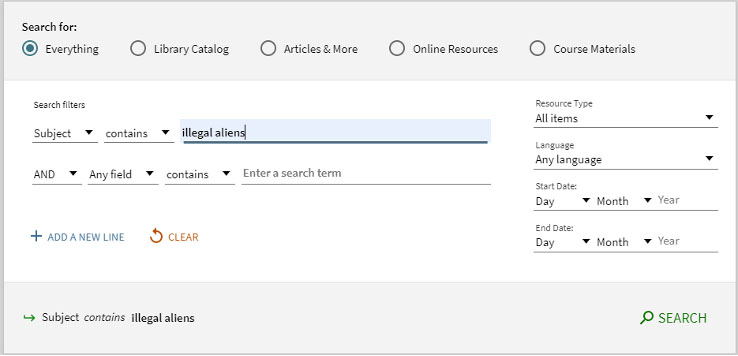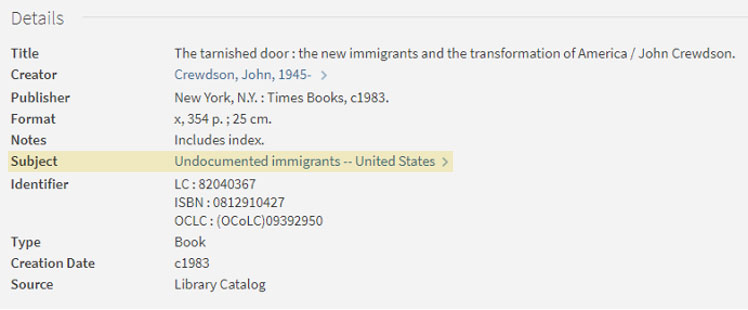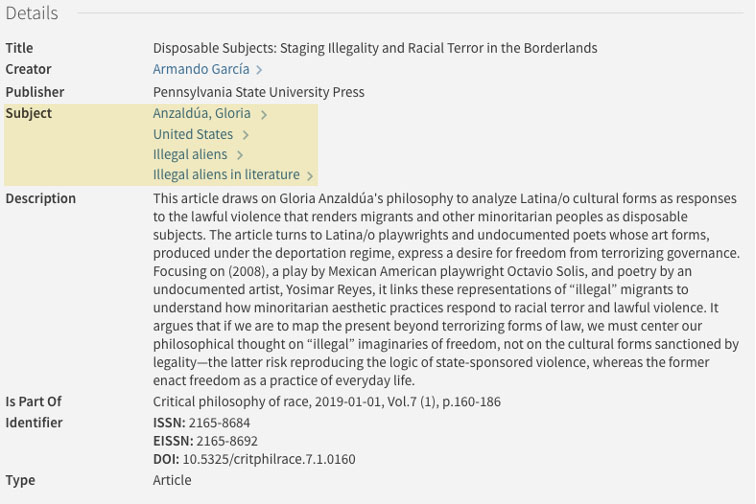Daniel Arbino is the Librarian for US Latina and Latino Studies at the Benson Latin American Collection.
In late summer 2020, I brought up the possibility of the University of Texas Libraries (UTL) participating in Change the Subject. This movement, documented in the 2019 film by the same title, was begun by students and librarians at Dartmouth College, who lobbied the Library of Congress to change anti-immigrant language in subject headings.
I partnered with Sean O’Bryan, Assistant Director of Access, who shared my admiration for the movement and who also had the technical know-how to foster the change. Thinking about ways to work toward continued inclusion, diversity, equity and accessibility (IDEA) of the Libraries’ collections, we began to explore the possibility of joining the Change the Subject movement. Today, I am proud to say that the UT Libraries has made strides in tackling outdated and often derogatory Library of Congress subject headings. Below, Sean gives a brief summary of the origins of the project and the resistance encountered by the Library of Congress when they eventually tried to update their terminology. We also describe how UTL participated in this project, considering local opportunities within our library catalog.
Background
Change the Subject started in 2014 when students and librarians at Dartmouth College initiated a collaboration with the Association (ALA) and the Library of Congress (LC) to formally change LC subject headings that contain the terms “illegal aliens” and replace them with terms that recognize the humanity of migrants and are less racially insensitive.
The Library of Congress put forth a plan to formally change subject headings containing “illegal aliens,” but members in the U.S. House of Representatives (led by representatives from Texas) intervened in 2016 by applying conditions to a funding bill and requiring the retention of the term “Illegal aliens” in authorized Library of Congress subject headings. This effectively ended Library of Congress’s participation in the project.
Despite the change in course for Library of Congress, libraries across the U.S. have joined in support of this project in various ways. Some have removed the authorized LC heading from their bibliographic records and replaced it with less biased local subject headings. Others have retained the authorized subject heading in their bibliographic records but have changed the rules in their discovery interfaces to replace the term displayed with a less biased one (similar to the option that UTL implemented; see below).
Option for UTL Participation
Access Systems staff reviewed participation by other institutions (most notably the State University of New York as well as the California State University system) and investigated various options for UTL to participate. Based on this review and given the Libraries’ infrastructure, the most effective option was to modify the display of subject terms in Primo, our discovery interface. Normalization rules in Primo were then created to display local, alternative terms such as “undocumented immigrants” as opposed to the existing Library of Congress subject terms (e.g., “illegal aliens,” “illegal immigrants,” etc.) in the brief display.
The UT Libraries retained the authorized LC subject headings (e.g., “illegal aliens,” “illegal immigrants”) in our local bibliographic records. This allowed the authorized LC terms to continue to be indexed and searched in our system. However, rather than display those authorized LC terms, the brief record results that users now see in Primo display locally determined alternative terms in their place. Again, this was done without altering the underlying bibliographic records. While it is important to note that this alternate display only impacts our local records, we are pleased to say that nearly 2,000 local records have been positively impacted with this change. Sadly, we are unable to change the display for records that are managed by ExLibris in the Alma Central Discovery Index (please see the last example in the section below).
Examples
A current advanced search in Primo with the LC subject “illegal aliens”:
A title selected from the former returned results displays the following brief record details (note the authorized LC subject heading):
Subject heading(s) in the brief record display is now configured to show alternate local terms (compare the view below with the one above):
The normalization rules that allow for the alternative display above impact local records in Primo (accounting for nearly 2,000 local records that underwent change). As noted above, we could not alter the display of non-local records, so they continue to display the authorized LC heading:
The Final Step
Prior to implementing the alternative subject headings, Sean and I worked with the Diversity Action Committee to make sure that our choices fostered values of diversity, inclusion, equity, and accessibility, as put forth by UTL’s IDEA platform. The Diversity Action Committee is a well-respected group within UTL precisely for their dedication to social justice and change. Presenting them with the alternative terms that we planned to implement was the final step to doing this the right way. Their expertise was much appreciated. To that end, this project was a group effort, with many people offering invaluable input, and I am grateful to everyone.
Never Too Late
In the middle of February 2021, reports surfaced that the Biden administration directed the Department of Homeland Security to refrain from using dehumanizing language like “illegal aliens.” Our hope is that the Library of Congress will soon follow suit. However, even if that happens, I do not believe that this project was in vain. For the library to take a stand in defense of the humanity of all of its users is never a waste of time.
Additional Information
If you have questions or an interest in additional information about the Change the Subject project, please contact Daniel Arbino. Those with questions or an interest in additional information about the technical aspects of implementing the option for participation described above, should please contact Sean O’Bryan.
Learn more about related work to update subject headings in intersectionality of gender, sexuality and U.S. Latinx identity in a post at the blog of the Libraries’ Diversity Action Committee.






 We can officially celebrate the completion of the Benson component of
We can officially celebrate the completion of the Benson component of